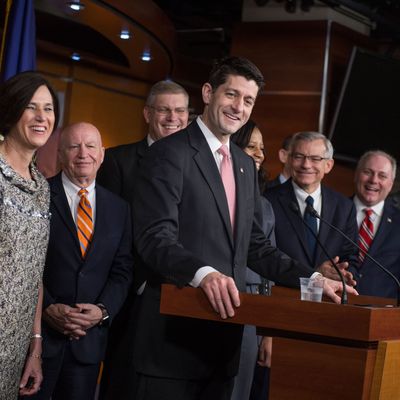
Last month, House Republicans tried to pass a health-care bill that would have slashed Medicaid by $880 billion to finance a tax cut for the rich; radically increased the cost of insurance for old people in rural America (a.k.a. the Republican base), so as to make it slightly cheaper for upper-middle-class young people in cities (a.k.a. the Democratic base); and established a system of subsidies for insurance so poorly designed it would have actually left more people uninsured than if you eliminated the entire Medicaid expansion — and every other part of Obamacare — and replaced them with nothing at all.
In short: Paul Ryan tried to pass a plan to increase the ranks of the uninsured by 24 million so as to pad the after-tax income of millionaire investors.
This proved to be unpopular with Americans who aren’t millionaire investors. Calls to congressional offices came in 50-to-1 against the bill; a Quinnipiac poll showed a mere 17 percent of voters supported it; all of the health-care sector’s major stakeholders, from doctors to hospitals to insurers to patients, declared the legislation too cruel for this world. (And a couple dozen delusional reactionaries from the lands of Rand and Limbaugh declared it to be not cruel enough.)
Opposition to the bill was so overwhelming that Ryan didn’t have the heart to bring it to the House floor.
In the weeks since Trumpcare died its first death, public opinion has turned even more sharply against it. Recent polls show:
(1) A majority of Americans want more federal spending on health care, not less — including a plurality of self-identified “tea party” Republicans.
(2) A majority of Americans now approve of Obamacare.
(3) Democrats now enjoy a 19-point advantage on the issue of health care, their largest such margin since 2009.
Paul Ryan’s caucus listened carefully to this feedback, and to that of their constituents. And after weeks of soul searching and negotiation, they have arrived at a compromise: the same bill, but with a new provision that allows states to opt out of guaranteeing affordable health insurance for non-affluent cancer patients.
As the Huffington Post reports:
GOP moderates and conservatives are nearing a deal on health care that in theory could get the Republican alternative to the Affordable Care Act out of the House and over to the Senate … The deal, brokered between House Freedom Caucus chairman Mark Meadows (R-N.C.) and Tuesday Group co-chairman Tom MacArthur (R-N.J.), would allow states to get waivers eliminating the so-called community rating provision ― the rule that prohibits insurers from charging higher premiums to people with pre-existing conditions. In order to obtain the waiver, states would have to participate in a federal high-risk pool or establish their own, and satisfy some other conditions.
In exchange for that conservative concession, the amendment would reinstate the Essential Health Benefits that were already taken out of the bill ― though, again, states could waive those provisions as well if they were able to show that doing so would lower premiums, increase the number of people insured, or “advance another benefit to the public interest in the state.”
To review: The original Trumpcare failed because recalcitrant conservatives in the House Freedom Caucus thought it left too many poor people with access to health care, while moderates in the Tuesday Group (along with a majority of the American people, and every major health-care interest group) thought it left too few with such access.
The GOP leadership then decided to favor the wishes of the part of its caucus that virtually no one in America agrees with. The White House floated allowing states to repeal both Obamacare’s Essential Health Benefits — which require every insurance plan sold on the individual market to cover mental health, maternity, hospitalization, and other basic services — and its community ratings provisions. House moderates did not like this.
And so, now, the party has reached a “compromise,” which allows states to repeal Obamacare’s Essential Health Benefits and community ratings provisions — but requires those that opt out to set up high-risk pools for people with preexisting conditions and to provide the White House with a short essay on why abolishing guaranteed benefits enhances liberty, or expands choice, or some such thing.
The practical effect of these changes would (almost certainly) be to increase the number of Americans who lose their insurance under the GOP’s plan. (High-risk pools only work as a means of guaranteeing affordable coverage to people with preexisting conditions if you devote way more funding to them than Republicans are willing to.)
It isn’t hard to see why some Freedom Caucus members might be won over by this proposal. It’s impossible to understand why moderates would.
As of this writing, the only moderate who appears to be on the record in support of the new legislation is MacArthur — who also supported the original Trumpcare. Meanwhile, Republicans in the Senate have continued to sour on Trumpcare. This week, Arkansas senator Tom Cotton vowed to oppose any bill that jeopardized coverage for those who gained insurance under the Medicaid expansion.
Nonetheless, the White House reportedly wants to see a new bill passed by day 100 of the Trump presidency — which is to say, by the end of next week. It would also like for congressional Republicans to deliver billions in funding for the president’s border wall by then, even though Democrats have already declared such funding a nonstarter, and Republicans need Democratic votes to keep the government from shutting down at the end of April.
Perhaps Trump thinks that his party’s moderates are more afraid of appearing legislatively impotent than out of touch with public opinion. Or maybe, the House leadership wants to shift blame for Trumpcare’s failure away from the Freedom Caucus and onto the Tuesday Group, for some strange reason.
Whatever the rationale, Zombie Trumpcare is officially undead again — and uglier than it’s ever been.






























